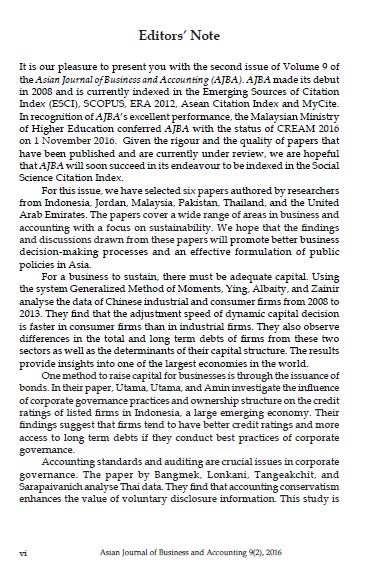Editor's Note
Main Article Content
Abstract
It is our pleasure to present you with the second issue of Volume 9 of
the Asian Journal of Business and Accounting (AJBA). AJBA made its debut
in 2008 and is currently indexed in the Emerging Sources of Citation
Index (ESCI), SCOPUS, ERA 2012, Asean Citation Index and MyCite.
In recognition of AJBA’s excellent performance, the Malaysian Ministry
of Higher Education conferred AJBA with the status of CREAM 2016
on 1 November 2016. Given the rigour and the quality of papers that
have been published and are currently under review, we are hopeful
that AJBA will soon succeed in its endeavour to be indexed in the Social
Science Citation Index.
For this issue, we have selected six papers authored by researchers
from Indonesia, Jordan, Malaysia, Pakistan, Thailand, and the United
Arab Emirates. The papers cover a wide range of areas in business and
accounting with a focus on sustainability. We hope that the findings
and discussions drawn from these papers will promote better business
decision-making processes and an effective formulation of public
policies in Asia.
For a business to sustain, there must be adequate capital. Using
the system Generalized Method of Moments, Ying, Albaity, and Zainir
analyse the data of Chinese industrial and consumer firms from 2008 to
2013. They find that the adjustment speed of dynamic capital decision
is faster in consumer firms than in industrial firms. They also observe
differences in the total and long term debts of firms from these two
sectors as well as the determinants of their capital structure. The results
provide insights into one of the largest economies in the world.
One method to raise capital for businesses is through the issuance of
bonds. In their paper, Utama, Utama, and Amin investigate the influence
of corporate governance practices and ownership structure on the credit
ratings of listed firms in Indonesia, a large emerging economy. Their
findings suggest that firms tend to have better credit ratings and more
access to long term debts if they conduct best practices of corporate
governance.
Accounting standards and auditing are crucial issues in corporate
governance. The paper by Bangmek, Lonkani, Tangeakchit, and
Sarapaivanich analyse Thai data. They find that accounting conservatism
enhances the value of voluntary disclosure information. This study is timely as the International Accounting Standards Board (IASB) has
proposed, in 2015, to reintroduce the concept of conservatism as a
means of increasing the usefulness of financial statements to investors.
Some of the financial reporting standards introduced by the IASB
require the use of fair value estimates. Using semi-structured interviews
with experienced Jordanian auditors, the paper by Abdullatif reveals
that Jordanian auditors find it a challenge to audit fair value estimates
in an environment that has limited reliable fair value information, a low
demand for high quality audits and which suffers from weak corporate
governance, in general.
A discourse on the sustainability of business is not complete
without venturing into the area of firms’ financial performance. The
paper by Ashraf, Jaafar, and Sulaiman focuses on online product
recommendations (“OPRs”). To enhance sales and thus, their financial
performance, e-retailers equip their sites with OPRs so as to provide
product recommendations to potential customers. Hence, it is important
for customers to be satisfied with OPRs use. Analysing the responses
of existing OPR users, Ashraf et al. find that perceived ease of use,
usefulness and confirmation are significant contributors to customer
satisfaction with OPRs.
In the final paper, Suwannarat concentrates on export intermediaries
which play an important role in enabling exporters to enter a wider
overseas market. Analysing data drawn from Thai export intermediary
firms, he finds that firm’s resources and competency to reduce clients’
transaction costs have a positive impact on their performance.
The guidance of the members of the editorial and advisory board
and the contributions of the reviewers play a crucial role in enhancing
the performance of AJBA. Likewise, the financial support from the
Malaysian Accountancy Research and Education Foundation is also
necessary in sustaining the journal. As the year 2016 draws to a close,
we wish to say a big ‘Thank You’ to them.
Thank you, and have a great 2017!
